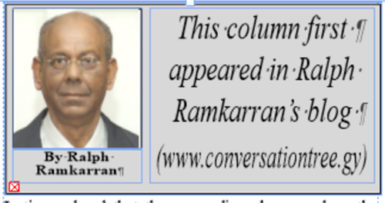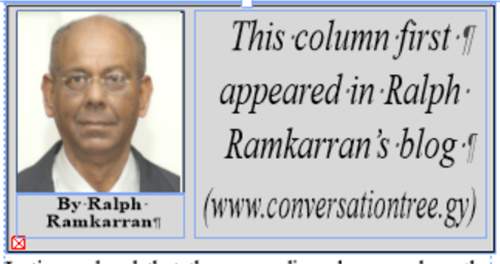 Bharrat Jagdeo’s incumbency as General Secretary of the PPP and Opposition Leader makes him the most authoritative figure within the PPP. The ease with which he swatted away the dominant influence of Donald Ramotar, Clement Rohee and Komal Chand in serious decision-making within the upper reaches of the PPP after the loss of the 2015 elections, testifies to his now enduring control of the direction of the PPP, last manifested when he secured the nomination of Donald Ramotar as the presidential candidate in 2011.
Bharrat Jagdeo’s incumbency as General Secretary of the PPP and Opposition Leader makes him the most authoritative figure within the PPP. The ease with which he swatted away the dominant influence of Donald Ramotar, Clement Rohee and Komal Chand in serious decision-making within the upper reaches of the PPP after the loss of the 2015 elections, testifies to his now enduring control of the direction of the PPP, last manifested when he secured the nomination of Donald Ramotar as the presidential candidate in 2011.
Komal Chand had always been a vocal and independent minded leader within the PPP. This was derived more from his inclinations than from the power base he held as General Secretary of GAWU. The need for restructuring of the sugar industry arose at around the time of Mr Jagdeo’s accession to office in 1999. Mr Chand’s positions in debate, particularly in relation to the sugar industry, became more pointed and vocal as time went on, especially during the 2006 to 2011 period when serious problems began to surface. But the problems which have been emerging in the sugar industry and the length of time for which Mr Chand has held leadership office in GAWU ‒ since about 1985 ‒ have weakened his grip. Thus, he lost his position as a member of the executive committee of the PPP after the 2016 congress of the PPP. Composition of this body is determined by a select few a day or two before the vote and a sufficient number of members of the central committee, which elects the executive committee, are given the word as to whom to support. Mr Chand’s orchestrated loss would have told him that his time in the leadership of the PPP and GAWU was drawing to an end.
The first salvo against Chand appeared in the Guyana Times of January 23 which is believed to reflect the views of Jagdeo. An unattributed article headed ‘Sugar Workers call on Komal Chand to Resign,’ said that sugar workers felt betrayed when he agreed in a meeting with President Granger that only some workers would receive their full severance immediately. The article said workers are calling on Chand to resign. Mr Chand attributed the article to “evildoers.” Anil Nandlall, the former Attorney General and a member of the executive committee of the PPP, from which Mr Chand was ousted, criticized GAWU’s approach and said that it ought to have taken a non-negotiable approach and demand that all workers be paid their severance in full because it is due.
GAWU is not quite outside the control of the PPP executive because it would normally take cognizance of those decisions. But while Mr Chand is the head of GAWU, it is not fully under the control of the PPP. By meeting with President Granger, perhaps without consultation with the PPP leadership, and taking a position which may not have been cleared with the leadership beforehand which runs counter to the campaign of the PPP against the closure of the estates, thereby demonstrating a modicum of independence, it has clearly attracted the ire of the PPP leadership. The end of Mr Chand’s tenure as the head of GAWU is within sight.
I have written previously that the PPP leadership is in transition. Some know when to leave. In early 2011, already knowing that I would not secure the nomination of the PPP, I indicated to several people, one of whom was in the leadership, that I would retire from active politics from the Party Congress after the elections. However, I was forced to resign before the Congress. Unless older leaders seize the opportunity to depart in an orderly fashion, they will face and have to defend complaints that changes in the demographics of the country are being engineered against the PPP by the forced migration of Indian Guyanese resulting from the closure of sugar estates. In this regard the PPP will also have to anticipate its response to migration from the Caribbean when the oil economy brings about a severe labour shortage. These new concerns and analyses will have to be reconciled to the still existing Marxist-Leninist orientation of the PPP.





